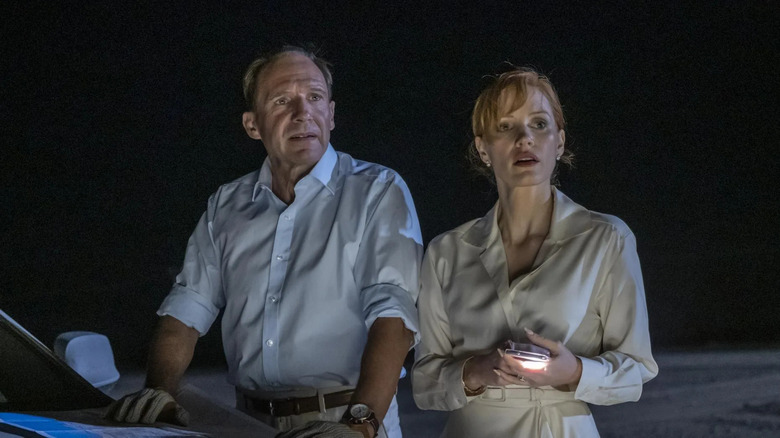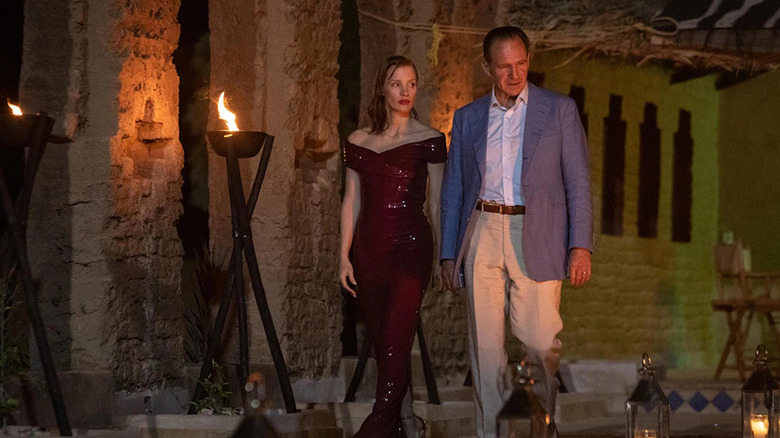The Forgiven Review: Unforgivably Bad
- Ralph Fiennes is always watchable, even if he struggles to elevate this material
- A satire of the super-rich that lacks bite
- Thinks it's offensive and daring -- it's just quite tiresome
- The McDonagh narrative formula is showing signs of fatigue
Deep in the Moroccan mountains, a wealthy white western couple accidentally kills a poor local boy in a car accident, and then they try to go about their lives as if nothing has changed. As far as satires on the self-absorption of the super-rich go, it's hard to find any that are less subtle than John Michael McDonagh's "The Forgiven," a darkly comic adaptation of Lawrence Osborne's novel of the same name, which was a much more straightforward psychological thriller. But if you think this synopsis sounds like the recipe for a feature-length variant of a "Succession" season finale, you're sorely mistaken. Here, the observations never extend beyond a surface-level acknowledgment that the upper class is detached from the day-to-day realities of the poor, and members of the elite are too absorbed in their own petty dramas to care about the problems faced by those lower on the food chain.
"The Forgiven" is a satire with no comic bite and one that suffers all the more because it arrives at the tail-end of a pop culture cycle of class warfare comedies, which range all the way from the straightforward likes of "Parasite" to the bloody horror inflections of "Ready or Not." Keeping the bare bones of Osborne's source material does ensure there is a dramatic arc, but McDonagh (who also scripted this adaptation) seems far less interested in this than he is in observing an upper-class circle whose lives are stuck in their ways even as they leave tragedy in their wake. It makes for a frustrating watch — one that understands its comic targets but has no interesting, let alone unique, material to skewer them with.
Sibling rivalry
In the film, David (Ralph Fiennes) and Jo (Jessica Chastain) are on a getaway in Morocco. Before we've even passed the 10-minute mark, as the film's entire closing credits instead roll in reverse during their initial arrival in the country (the film's only noteworthy stylistic choice), they accidentally run over a Moroccan boy who is out selling fossils by the road. They call the cops, but not before they show up at the lavish villa owned by another upper-class western couple (Matt Smith and Caleb Landry-Jones), ready for the weekend of partying that was planned. However, the locals, already frustrated with these western ex-pats, don't want to give them any peace — and soon, David finds himself sent to the village where the boy was from to meet his family and directly take responsibility for his actions, something he's only prepared to do begrudgingly.
McDonagh is the older brother of playwright and director Martin McDonagh, and it's no secret the two share a sensibility if not the same success rate. His younger sibling is best known for daring efforts like "In Bruges" and "Three Billboards Outside Ebbing, Missouri," films that caused considerable controversy even though they had a more coherent approach to their weighty subject matter. The elder McDonagh, on the other hand, frequently feels like he's chasing his brother's shadow with his fondness for potentially offensive subject matter, dialogue that manages to be both profane and deeply literary, and the fact his casting decisions usually mean borrowing actors who've worked with his brother (in this case, Ralph Fiennes appeared in "In Bruges," and Caleb Landry Jones in "Three Billboards"). He has made good films before, such as 2014's crisis of faith drama "Calvary," but his similar approach to writing as his far more established brother dooms him to exist within his shadow.
"The Forgiven" isn't quite as bad as his previous film, 2016's "War on Everyone," a police brutality drama that was every bit as emptily offensive as the detractors of "Three Billboards" claimed that film was. But it does share the same problem — the sense that this is a filmmaker more interested in lazily pushing buttons to little satirical effect (the local community is frequently referred to as "ISIS" by these privileged white tourists, for example), making any aspirations towards substantial class satire come off as shallow. In the film's third act, as David is sent on a mission of atonement, the film does build dramatic momentum, aiming to contrast this with the petty domestic dramas of the rich who stay within the villa. But there's little meat to this satirical idea beyond merely highlighting it. By the end, you get the sense that the actors might have had a lovely time filming this in the sun, but that doesn't translate to anything that holds your attention onscreen.
Lacking bite
As for the cast themselves, nobody manages to liven up their line readings — you could never mistake this for a film by the considerably more talented McDonagh sibling. Fiennes, who proved that his true talent lies in comic performances in the younger McDonagh's "In Bruges," gets little to play with here. The early sequences are broad in concept (for example, a rich man going horse riding the morning after killing someone, oblivious to how this looks), but lack an effective pay-off, with his quasi-redemptive arc likely reading a lot stronger on the page than it does in execution. He fares a lot better than Chastain though, who at the very least is rising to the assignment of playing a self-absorbed woman entirely disaffected from her own marriage, but conveys this largely through monotone line readings that frequently veer into the unintentionally hilarious. For a writer who specializes in comedy, it's somewhat damning that the few laughs to be had are courtesy of the recent Oscar winner delivering throwaway lines like "hot chocolate, yum" with a completely blank expression.
Of course, simplifying a McDonagh film and describing it as simply a "comedy" is doing a disservice to a writer whose films are all morality plays. Like his younger brother, he's fascinated with studies of seemingly irredeemable people, letting them wallow in their despicable ways obliviously, only to offer them a redemptive lifeline the moment their fate has already been sealed. The problem with "The Forgiven" is that these characters are never fleshed out beyond being caricatures of the super-rich. Fiennes, an unquestionably terrific actor, can only do so much to challenge the audience's perception of this character when the material on the page is nothing more than a thinly written sketch of an upper-class man who thinks he can buy his way out of any situation. Giving him a redemptive arc that could make the audience sympathize with him should twist the knife — instead, it just feels like McDonagh is blindly following the tried-and-tested narrative formula that both he and his brother have put to much more effective use elsewhere, the drama never triggering the same internal conflict in viewer sympathy as, say, "In Bruges" would manage.
"The Forgiven" is another disappointing effort from John Michael McDonagh; adapting another writer's work hasn't reinvigorated his increasingly formulaic approach to the morality play.


